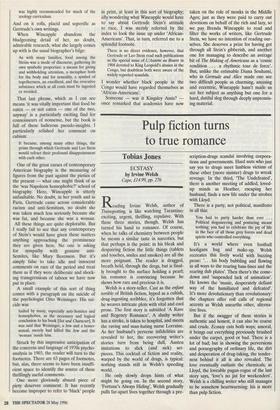Pulp fiction turns
to true romance
Tobias Jones
ECSTASY by Irvine Welsh Cape, £14.99, pp. 276 Reading Irvine Welsh, author of Trainspotting, is like watching Tarantino: exciting, urgent, thrilling, repulsive. With these three stories, though, Welsh has turned his hand to romance. Of course, when he talks of chemistry between people he means a similar taste in narcotics, but that perhaps is the point: in his bleak and despairing fiction the little things (tablets and touches, smiles and smokes) are all the more poignant. The reader is dragged, breath held, through the dregs, but is final- ly brought to the surface holding a pearl; his romance is convincing because he shows how rare and precious it is.
Welsh is a story-teller. Cast as the enfant terrible of British fiction, hyped as a cultish, drug-ingesting scribbler, it's forgotten that he weaves intricate plots with vital and cool prose. The first story is subtitled 'A Rave and Regency Romance'. A slushy writer has a stroke, is taken to hospital, and meets the raving and man-hating nurse Lorraine. As her husband's perverse infidelities are revealed to her, the recovering writer's stories turn from being dull, Austen imitations to slick (and sick) set- pieces. This cocktail of fiction and reality, warped by the world of drugs, is typical: nothing stands still in Welsh's speeding world.
He only slowly drops hints of what might be going on. In the second story, 'Fortune's Always Hiding', Welsh gradually pulls far-apart lives together through a pre- scription-drugs scandal involving corpora- tions and governments. Hard nuts who just say yes to drugs meet limbless victims of these other (more sinister) drugs to wreak revenge. In the third, 'The Undefeated', there is another meeting of addled, loved- up minds as Heather, escaping her husband, finds a new life under the strobes with Lloyd.
There is a party, not political, manifesto in all this:
You had to party harder than ever ... Political sloganeering and posturing meant nothing; you had to celebrate the joy of life in the face of all those grey forces and dead spirits who controlled everything.
It's a world where even football hooligans hug and make-up. Welsh recreates this lively world with buzzing prose: . . his body bubbling and flowing in all ways to the roaring bass-lines and the rearing dub plates'. Then there's the come- down and 'suspended lack of animation'. He knows the 'manic, desperately defiant way of the humiliated and defeated'. It's more devolutionary than revolutionary: the chapters offer roll calls of regional accents as Welsh unearths other, alterna- tive lives.
But if the swagger of these stories is authentic and honest, it can also be coarse and crude. Ecstasy cuts both ways; amoral, it brings out everything previously brushed under the carpet, good or bad. There is a lot of bad; but in showing the perversions and pornography of ordinary life, the dirt and desperation of drug-taking, the tender- ness behind it all is also revealed. The love eventually outlasts the chemicals; as Lloyd, the loveable pagan-rogue of the last story says, 'love's no jist for weekenders'. Welsh is a chilling writer who still manages to be somehow heartwarming: his is more than pulp fiction.


























































 Previous page
Previous page